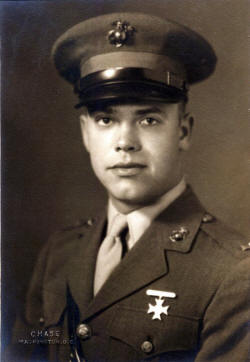|
Special Veterans Day feature
 A veteran remembers Iwo Jima A veteran remembers Iwo Jima
Jacksonville resident Warren Musch looks back at the carnage of
invading Japanese soil
By Mark
DePue, oral history director at the Abraham Lincoln
Presidential Library and Museum
 Send a link to a friend
Send a link to a friend
[November 11, 2013]
SPRINGFIELD -- Lt. Warren Musch,
now of Jacksonville, had a lot to consider as he waited his turn on
Feb. 19, 1945, to land on the tiny volcanic island of Iwo Jima. As
he watched the Navy's intense bombardment, his thoughts turned to
his father's farm near Virginia, Ill., and to his new bride,
Haroldine. He thought about his fellow Marines, about the sulfuric
sands of Iwo Jima and the inherent dangers of landing on an island
bristling with defensive works manned by an enemy bent on
destruction of the invading forces.
|
 Most of all, he thought about his job as the 3rd Battalion's
Intelligence Section officer, part of the 28th Regiment of the 6th
Marine Division, and about the unit's initial mission once on shore:
to seize the high ground -- the imposing heights of Mount Suribachi. Most of all, he thought about his job as the 3rd Battalion's
Intelligence Section officer, part of the 28th Regiment of the 6th
Marine Division, and about the unit's initial mission once on shore:
to seize the high ground -- the imposing heights of Mount Suribachi.
"I landed in the 13th wave, at one o'clock," recalled Musch
nearly 67 years later. "I guess the best way to describe it was all
hell broke loose, because the Japanese had all their mortars,
artillery, machine guns and everything zeroed in on the beaches, and
were giving us all they had."
Once on the beach, "I could reach out and touch a dead Marine
with my left hand, another with my right hand," he said. "They had
camouflage paint on their faces. That's when the shock really hit
me. I was there in the midst of the real thing. ... As I started to
raise up, a Japanese machine gun knocked that volcanic sand in my
face, about 6 inches above my head."

What he saw next spurred him to action. A landing craft took a
direct hit just as the ramp slammed down to unload its precious
cargo of Marines. "I quickly decided the beach was no place to be
and took off running, from shell hole to shell hole. It's still a
mystery how myself and my 18 men all arrived at the right place at
the right time, designated spot, without anybody getting hit."
On D-Day plus four, Musch watched as a small band of Marines
raised a flag on the top of Mount Suribachi. "Ships blew their
whistles. Everybody was hilarious. It was a great morale-booster,"
he said. But he thought little of it after that. He had a job to do
in a very dangerous place.
Musch survived the bloody monthlong campaign at Iwo Jima,
counting himself among the luckiest of men. "My battalion had 70
percent casualties. The other two battalions, one had 74, the other
had 75 percent causalities."
Of the Marines who landed on Iwo, only 3 out of 10 survived
without being killed or wounded. Over 6,800 Americans lost their
lives during the campaign.
Next stop was Camp Tarawa on the Big Island of Hawaii, where
Musch, now assigned to the regimental headquarters intel section,
assisted in the plans for the invasion of Japan.
[to top of second column] |

Code-named Operation Downfall, the plan was comprehensive and
ambitious, with the island of Kyushu designated as the target for
the 6th Marine Division. Overall, said Musch, the invasion of Kyushu
in November would take 14 divisions: three Marine and 11 Army
divisions.
"I suddenly thought that, Gee, with as many people involved and
as bad as it was to fight the Japanese on Iwo Jima, this would be
still closer to their homeland. It would be a more difficult
situation forever, because they fought to the last man on Iwo. They
would do so on Kyushu. ... I started working on that, and quickly
decided that, Well, I survived Iwo, but I would not survive that
operation."
The landings on Kyushu were just the first phase of Operation
Downfall. Next, as Musch recalled, would come the landings "on the
Tokyo Plain -- 28 divisions involved: three Marine and 25 Army.
Three million men involved in the operation, minimum, and at least a
million casualties." The projected Japanese death toll went into the
millions.
Faced with all that, Musch has no doubts about the wisdom of
President Truman's decision to drop atomic bombs on mainland Japan,
first on Hiroshima, then Nagasaki. As an intelligence officer, he
knew better than most the terrible cost of invading Japan. Only an
overwhelming show of force could have convinced the Japanese of the
futility of their cause.
He put it bluntly: "The atomic bomb saved my life."

Musch was thrilled when he heard the news on Aug. 15 that the
Japanese had surrendered. "We ran out in the streets and celebrated.
Everybody was hooping and hollering and carrying on. And my job
ended."
It was time to hang up his combat dungarees, return to Haroldine
and the family farm, and get busy living life to the fullest.
[Text from
Abraham
Lincoln Presidential Library and Museum
file received from the
Illinois Historic
Preservation Agency] |